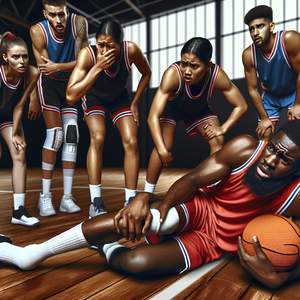The Untold Stories of Walk-On Players

For many walk-on players, the journey starts long before they step onto a college campus. These athletes often come from high school programs where they were overlooked, under-recruited, or simply not given the opportunities to shine on a larger stage. Take, for instance, the story of Jake, a walk-on at a Division I university. Despite leading his high school team to a state championship, he received no scholarship offers. Undeterred, Jake decided to try out for the college football team, fully aware of the uphill battle ahead. This initial leap of faith requires not only talent but also an unwavering belief in oneself. Walk-ons must showcase their skills in front of coaching staff and compete against scholarship athletes who often have the advantage of more extensive training and resources. As Jake discovered, the tryout process can be grueling, often filled with moments of self-doubt and anxiety. Yet, it is this very determination that sets walk-ons apart, pushing them to fight for their spot on the roster.
The Daily Grind: Overcoming Challenges
Once they make the team, walk-on players face a different set of challenges. Unlike scholarship athletes, they don't receive financial support for tuition, room, or board, which means balancing academics, athletics, and sometimes jobs to make ends meet. For many, this struggle is a defining aspect of their college experience. Consider Sarah, a walk-on kicker who juggled a part-time job at a local café while attending classes and fulfilling her football commitments. “It was exhausting,” she recalls, “but every time I kicked that ball, it reminded me why I was doing this.” The commitment to the sport, combined with financial pressures and academic responsibilities, creates a unique and often overwhelming environment for walk-ons. Moreover, walk-ons must constantly prove themselves to coaches and teammates. The competition is fierce, and they often have to work harder to earn respect. They may not see the field during games, but their contributions during practice and team drills are invaluable. They push their teammates to improve, serving as the backbone of the team, embodying the true essence of hard work and dedication.
Moments of Triumph: The Payoff of Persistence
Despite the odds, many walk-on players find a way to succeed, whether through earning a starting position or making significant contributions to the team. Their stories are filled with moments that inspire not just their teammates but also fans and fellow students. One notable example is that of a walk-on defensive back who, after years of hard work and dedication, intercepted a crucial pass in a championship game, leading his team to victory. The moment was not just a personal triumph; it symbolized the dreams of countless athletes who aspire to make their mark despite the challenges they face. Moreover, the camaraderie and bonds formed among walk-ons and scholarship players often lead to a unique team dynamic. Walk-ons frequently serve as motivators, instilling a sense of grit and determination that can elevate the entire team’s performance. Their passion for the game, coupled with their resilience, often inspires the entire roster.
The stories of walk-on players in college football are a testament to the indomitable spirit of those who dare to dream, regardless of the obstacles in their way. They remind us that success is not solely defined by scholarships or accolades but also by hard work, heart, and unwavering determination. As we celebrate the victories on the field, we must also recognize the journeys of these underdogs, whose dedication and perseverance contribute to the rich tapestry of college football. Through their stories, they not only inspire future generations of athletes but also enrich the culture of the sport itself, reminding us that every player on the roster has a story worth telling.
Sports Management Coordinator
Universities, athletic departments, sports organizations
Core Responsibilities
Assist in the planning and execution of athletic events and programs, ensuring smooth operations and athlete support.
Manage communications between coaching staff, athletes, and administrative personnel to foster a cohesive team environment.
Required Skills
Strong organizational skills with an ability to multitask in a fast-paced environment.
Excellent communication and interpersonal skills to effectively liaise with diverse groups.
Athletic Trainer
Colleges, professional sports teams, fitness centers
Core Responsibilities
Develop and implement injury prevention programs for athletes, focusing on physical conditioning and rehabilitation.
Provide immediate care for injuries during practices and games, maintaining athlete safety and performance.
Required Skills
Certification in athletic training (e.g., NATA-BOC) and knowledge of sports science.
Strong problem-solving abilities and the capability to work under pressure during high-stakes situations.
Talent Scout
College athletic programs, professional sports franchises, sports management agencies
Core Responsibilities
Evaluate prospective athletes at high school and junior college levels, assessing their skills, potential, and fit for specific programs.
Build relationships with coaches, athletes, and parents to gather insights and foster recruitment efforts.
Required Skills
Deep understanding of the sport and the ability to analyze player performance metrics.
Strong networking skills and the ability to communicate effectively with varied audiences.
Sports Psychologist
Colleges, sports clinics, private practice
Core Responsibilities
Provide mental health support and performance enhancement strategies for athletes, focusing on stress management and motivation.
Conduct workshops and individual sessions to improve athletes' mental resilience and team dynamics.
Required Skills
Advanced degree in psychology or related field, with specialization in sports psychology.
Ability to understand and address the unique pressures faced by athletes, especially walk-ons.
Community Engagement Director for Athletic Programs
University athletic departments, nonprofit organizations, community centers
Core Responsibilities
Develop and implement programs that promote community involvement in college sports, enhancing the visibility and support for the athletic department.
Organize outreach initiatives, events, and partnerships that connect athletes with local organizations and youth programs.
Required Skills
Strong project management and event planning skills.
Excellent public relations and communication abilities to effectively engage with community stakeholders.


